- Clone
- 590H11G1E3 (See other available formats)
- Regulatory Status
- RUO
- Other Names
- C-Mer Proto-Oncogene Tyrosine Kinase, c-mer, Proto-Oncogene C-Mer, MER Receptor Tyrosine Kinase, STK Kinase, Receptor Tyrosine Kinase MerTK, Tyrosine-Protein Kinase Mer, MER, RP38, c-Eyk, Tyro12
- Isotype
- Mouse IgG1, κ
- Ave. Rating
- Submit a Review
- Product Citations
- publications
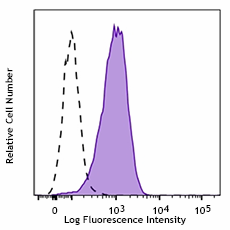
-

Human peripheral blood monocytes were stimulated and cultured with M-CSF for seven days and stained with human MERTK (clone 590H11G1E3) APC/Fire™ 750 (filled histogram) or mouse IgG1, κ APC/Fire™ 750 isotype control (open histogram).
| Cat # | Size | Price | Quantity Check Availability | Save | ||
|---|---|---|---|---|---|---|
| 367613 | 25 tests | 128€ | ||||
| 367614 | 100 tests | 287€ | ||||
MERTK plays a role in the retinal pigment epithelium as a regulator of rod outer segments fragments phagocytosis. MERTK also plays a role in the inhibition of Toll-like receptor-mediated innate immune responses through the activation of STAT1. Upregulation of MERTK seems to also promote the survival of certain cancer cells, such as t(1;19)-positive acute lymphoblastic leukemias (ALL). MERTK also has a role in cellular migration, as MERTK KO macrophages demonstrate cytoskeletal disruptions that impacts its shape and directional migration. Melanoma cells express high levels of MERTK, which makes this molecule an attractive therapeutic target.
Product DetailsProduct Details
- Verified Reactivity
- Human
- Antibody Type
- Monoclonal
- Host Species
- Mouse
- Immunogen
- MERTK extracellular domain/Fc fusion.
- Formulation
- Phosphate-buffered solution, pH 7.2, containing 0.09% sodium azide and BSA (origin USA)
- Preparation
- The antibody was purified by affinity chromatography and conjugated with APC/Fire™ 750 under optimal conditions.
- Concentration
- Lot-specific (to obtain lot-specific concentration and expiration, please enter the lot number in our Certificate of Analysis online tool.)
- Storage & Handling
- The antibody solution should be stored undiluted between 2°C and 8°C, and protected from prolonged exposure to light. Do not freeze.
- Application
-
FC - Quality tested
- Recommended Usage
-
Each lot of this antibody is quality control tested by immunofluorescent staining with flow cytometric analysis. For flow cytometric staining, the suggested use of this reagent is 5 µL per million cells in 100 µL staining volume or 5 µL per 100 µL of whole blood.
* APC/Fire™ 750 has a maximum excitation of 650 nm and a maximum emission of 774 nm. - Excitation Laser
-
Red Laser (633 nm)
- Application References
-
- Rogers AE, et al. 2012. Oncogene 31:4171.
- RRID
-
AB_2721482 (BioLegend Cat. No. 367613)
AB_2721483 (BioLegend Cat. No. 367614)
Antigen Details
- Structure
- Transmembrane protein with two fibronectin type-III domains, two Ig-like C2-type domains, and one tyrosine kinase domain.
- Distribution
-
Macrophages, monocytes, and dendritic cells.
- Function
- TLR regulation, efferocytosis, phagocytosis regulation, cell survival, and macrophage migration.
- Interaction
- GRB2, PLCG2, and TNK2.
- Ligand/Receptor
- LGALS3, TUB, TULP1, and GAS6.
- Cell Type
- Dendritic cells, Macrophages, Monocytes
- Biology Area
- Apoptosis/Tumor Suppressors/Cell Death, Cell Biology, Cell Motility/Cytoskeleton/Structure, Costimulatory Molecules, Immunology, Innate Immunity, Neuroscience, Neuroscience Cell Markers
- Molecular Family
- Protein Kinases/Phosphatase, Toll Like Receptors
- Antigen References
-
1. Schlegel J, et al. 2013. J. Clin. Invest. 123:2257.
2. Chen J, et al. 1997. Oncogene 14:2033.
3. Yefimova MG, et al. 2013. Autophagy 9:653.
4. Zhang W, et al. 2013. J. Med. Chem. 56:9693.
5. Lee YJ, et al. 2012. J. Leuko. Biol. 91:921.
6. Krause S, et al. 2015. Blood 125:820.
7. Tang Y, et al. 2015. PLoS One 10:e0117787. - Gene ID
- 10461 View all products for this Gene ID
- UniProt
- View information about MERTK on UniProt.org
Related FAQs
Other Formats
View All MERTK Reagents Request Custom Conjugation| Description | Clone | Applications |
|---|---|---|
| Purified anti-human MERTK | 590H11G1E3 | FC |
| Brilliant Violet 421™ anti-human MERTK | 590H11G1E3 | FC |
| Alexa Fluor® 647 anti-human MERTK | 590H11G1E3 | FC |
| PE anti-human MERTK | 590H11G1E3 | FC |
| APC anti-human MERTK | 590H11G1E3 | FC |
| PE/Cyanine7 anti-human MERTK | 590H11G1E3 | FC |
| APC/Fire™ 750 anti-human MERTK | 590H11G1E3 | FC |
| Biotin anti-human MERTK | 590H11G1E3 | FC |
| TotalSeq™-A0423 anti-human MERTK | 590H11G1E3 | PG |
| Brilliant Violet 711™ anti-human MERTK | 590H11G1E3 | FC |
| PerCP/Cyanine5.5 anti-human MERTK | 590H11G1E3 | FC |
| TotalSeq™-C0423 anti-human MERTK Antibody | 590H11G1E3 | PG |
Compare Data Across All Formats
This data display is provided for general comparisons between formats.
Your actual data may vary due to variations in samples, target cells, instruments and their settings, staining conditions, and other factors.
If you need assistance with selecting the best format contact our expert technical support team.
-
Purified anti-human MERTK
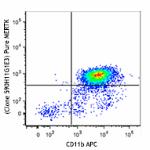
Human monocytes were stimulated and cultured with M-CSF for ... 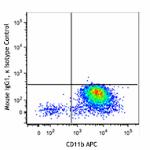
-
Brilliant Violet 421™ anti-human MERTK
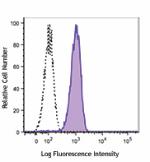
Human peripheral blood monocytes were stimulated and culture... -
Alexa Fluor® 647 anti-human MERTK
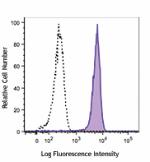
Human peripheral blood monocytes were stimulated and culture... -
PE anti-human MERTK
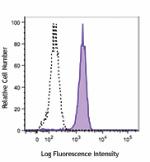
Human peripheral blood monocytes were stimulated and culture... -
APC anti-human MERTK
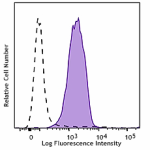
Human peripheral blood monocytes were stimulated and culture... -
PE/Cyanine7 anti-human MERTK
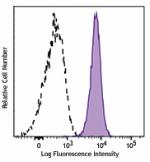
Cell line U937 was stained with human MERTK (clone 590H11G1E... -
APC/Fire™ 750 anti-human MERTK
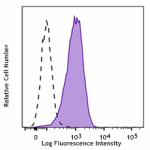
Human peripheral blood monocytes were stimulated and culture... -
Biotin anti-human MERTK
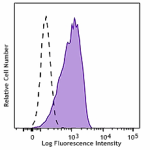
Human peripheral blood monocytes were stimulated and culture... -
TotalSeq™-A0423 anti-human MERTK
-
Brilliant Violet 711™ anti-human MERTK
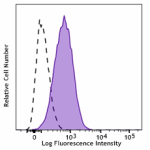
Human peripheral blood monocytes were stimulated and culture... -
PerCP/Cyanine5.5 anti-human MERTK
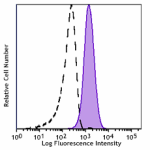
Human histocytic cell line, U937 were stained with human MER... -
TotalSeq™-C0423 anti-human MERTK Antibody
 Login / Register
Login / Register 













Follow Us